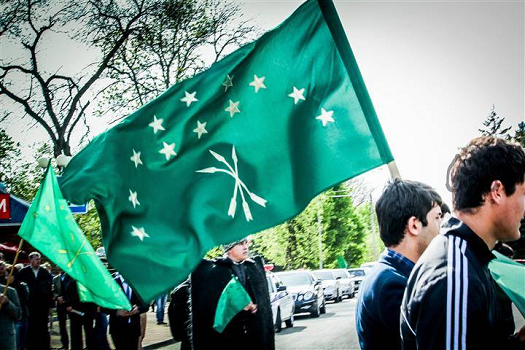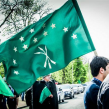
Circassians in Predominantly Ethnic-Russian Krasnodar Demand Recognition as Region’s Indigenous Population
Publication: Eurasia Daily Monitor Volume: 13 Issue: 151
By:

Ramazan Khun, a Circassian activist from Russia’s Krasnodar region, posted an unusual online petition on the website Change.org. The petition calls on the Russian government, President Vladimir Putin, and the administration of Krasnodar krai to grant indigenous rights to the Circassians, who reside on the territory of this southwestern Russian region.
The petition says: “Most cities and rivers [in Krasnodar region] have Circassian names. For centuries, Circassians have lived here; still Krasnodar Territory’s Administration has not recognized my people as the indigenous population of the region. It means a lot to my people and the history of our ancestors. We do not need anything else than the recognition of this fact. If it happens, then my people will be able to turn the page of history and with gratitude go further forward! My people love their country [Russia] and defend its honor in sport, and in the military field. And so let our great country meet my people half way and recognize this fact because justice must prevail!” (Change.org, accessed September 20).
Krasnodar is currently a predominantly ethnic-Russian region in southern Russia with a population of 5.5 million and an area measuring about 29,000 square miles. Ethnic Circassians today comprise less than half of one percent of the population of Krasnodar region. However, until the start of the 19th century, Circassians occupied the entire territory of modern Krasnodar and effectively controlled the Black Sea coast. Following the Russian armies’ advances, Circassians retreated to the mountains. Eventually, the vast majority of them were forced to leave their homeland and flee to the Ottoman Empire. An estimated 90 percent of the Circassians at the time either starved to death, died of decease or were deported to foreign lands by the Russian government (Natpressru.info, July 10, 2010).
Moscow has failed to recognize that the 19th century Russian government decimated the Circassian population along the Black Sea coast. Circassian activists have intensively petitioned Moscow for the recognition of the Circassian “genocide” in recent years but have achieved little when it comes to acknowledgement of their grievances by Russia. In particular, Circassian activists say that the authorities of Krasnodar region intentionally ignore their pleas to recognize them as the indigenous population of the area. The primary reason for the rejection of Circassians’ claims is reportedly that “Circassians’ play the nationalist card.” The chair of the Circassian Council of Elders of Krasnodar region, Ruslan Gvashev, says, “They are scared of us. I do not understand why they fear us. We want to be citizens with equal rights while remaining Circassians. Include us into the Code of Krasnodar region.” According to Gvashev, numerous leaders of Krasnodar’s authorities have promised to recognize the Circassians as the indigenous people of the region, but these promises never materialized. Moreover, even the regional history textbooks ignore the Circassians as the indigenous population of the area. The paradox is that many people in Krasnodar region unofficially recognize the Circassians as the autochthonous people of the region, but government policy appears to be intentionally designed to exclude them from regional history (Onkavkaz.com, September 14).
Apparently, regional officials and the Russian authorities in Moscow fear that recognition of the Circassians as the indigenous people of the area will somewhat increase the validity of their claims for the recognition of the Circassian “genocide.” It would also indicate a closer connection between Krasnodar krai and the ethnic republics of the North Caucasus, something that both Moscow and Krasnodar authorities want to avoid. However, a refusal to recognize the Circassians’ indigenous rights also fuels their resentment. Currently, the Krasnodar authorities pretend that the Cossacks were the “indigenous people” of the area, even though their history in Krasnodar started in the 19th century and everything before that is “forgotten.”
Although, to date, Circassian activists have been largely unsuccessful in gaining greater accommodation of their demands by Moscow, they have certainly achieved a much better self-awareness among the Circassians themselves. Vladimir Putin has personally pushed for “unified history textbooks,” which would surely and conveniently “forget” about the Circassians and their struggle with the Russian Empire, along with other inconvenient truths (Slon.ru, May 5, 2015). But due to the rising national consciousness of the Circassian people, such attempts to rewrite history are increasingly unlikely to work among this group.
Little by little, modern Circassians have been rediscovering their history, which Russian and Soviet authorities had previously carefully stripped of all their important and proud historical moments. Among such events, Circassian activists have recently pointed to Article 6 of the Belgrade Treaty between the Russian Empire and the Ottoman Empire, signed on September 18, 1739. According to this point in the treaty, the activists argue, the Circassian lands at that time should have been granted independence, as they were formally released from any obligations to either the Ottomans or the Russians (Facebook.com, September 18).
The dynamics of today’s Circassian movement and the Russian government’s reaction to it indicate that the authorities in Moscow will not be mollified by the Circassians’ passivity. Rather, this ethnic minority has learned that activism and collective action is needed to improve its bargaining positions vis-à-vis Moscow. For now, the Circassians have managed to calibrate their activities so as to push for a rejection of the loss of historical memory but without incurring any violent reprisals from the Russian government. It remains to be seen, however, whether growing frustration eventually throws this relationship out of balance.




